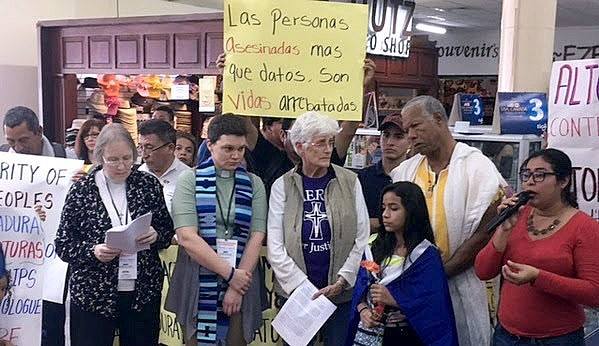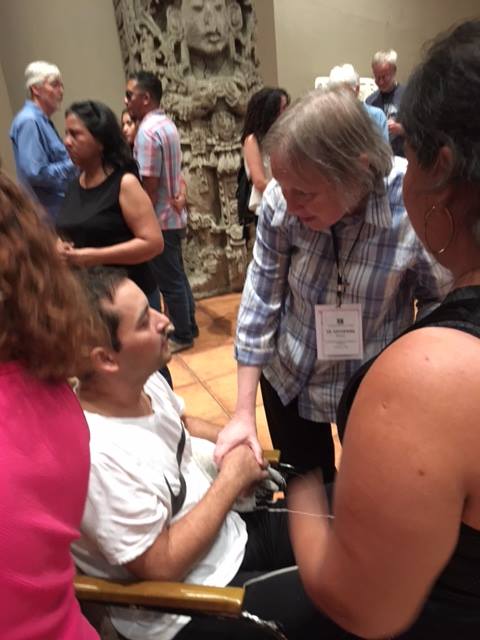Witness and Solidarity: Sister Kathlyn Mulcahy in Honduras
The days surrounding the unconstitutional re-inauguration of Honduran president Juan Orlando Hernandez last month were fraught with danger for anyone who spoke out against the regime or dared to oppose his election. Because of this, religious leaders in the country asked for an interfaith delegation to stand beside them. Our Sister Kathlyn Mulcahy was among those who participated in the 50-person delegation, January 24-30, 2018.
This was not Sister Kathlyn’s first encounter with oppressed central American peoples. The Kankakee, Ill., native served in Peru 1996-2009 and accompanied the people of Huancayo province in a truth and reconciliation process that followed the defeat of the Peruvian Maoist terrorist group, Sendero Luminoso. She now serves a member of the Springfield Dominican Sisters leadership team, with offices at Sacred Heart Convent. Here she shares some of her experience during the delegation.

What during your trip moved you the most or opened your heart to the people of Honduras?
“The only thing stronger than fear is hope.”
Witnessing the fierce vulnerability of hope in the people was both a powerful and heart-rending experience. José Luis, a young radio journalist, said he feared he might be shot in the back walking away from a protest, turned to look back—and was shot in the eye. The wife of David, who died in the hospital where he was successfully recovering from surgery for a gunshot wound after a protest and died suddenly after visits from the military police who had shot him, explained how she was being followed and harassed by the police—and begged us, if they killed her too, to get her young sons out of the country for their safety. María spoke as her husband José sat silently in a wheelchair next to her, telling how he was left paralyzed and severely brain-injured after being shot by the police while walking home from work. He wasn’t even involved in the protest along his route.
These and many others shared their experience with us even though reporting such incidents is met with violent repression and continued harassment from the very “authorities” charged with their protection. They risked sharing their experience in the hope that their children would be able to one day live in peace in their own country.
What else did you do in Honduras?
“Standing with” the people of Honduras was our literal stance. Members of the delegation attended several protests calling for justice and a return to democratic constitutional authority. We stood by as witnesses, hoping our very presence would keep peace—at least in the immediate situation. We held a banner that proclaimed in Spanish and English the Old Testament text from Ruth, “Your people will be my people.” We spent several hours standing with young protesters who were blocking a highway in protest of the unconstitutional and widely-questioned election results. The 25-30 protesters were flanked by at least as many national police officers outfitted in riot gear, with shields, automatic weapons, and tear gas. Thankfully, the protest ended peacefully, with protesters ready to make the two-mile walk back to their village. But they feared the police would be waiting along the way to ambush them. There was only peace now “because you were here,” they said to delegation members. So, we accompanied them to their village, walking ahead, behind and alongside these young voices for justice.
What is the message or action you would you ask us to carry to others?
As well as praying for justice for the people of Honduras, we ask that you lobby legislators to end U.S. military aid to Honduras.It is being used to fund state-sponsored terrorism against the Honduran people who seek basic human rights and support constitutional justice in their country.
Ironically, while I cannot in any way condone or support the present U.S. administration’s stance against immigrants, it is U.S. government policy in Honduras that is one of the root causes pushing Honduran emigration. People are fleeing for their lives—and their children’s—not just from gangs and random violence, but from state-sponsored violence against those who cry out for justice.
For more information about the delegation visit People of Faith Root Causes Delegation.
Here is a more complete report from Sister Kathlyn.



My heart aches for the Honduran people who are daily at risk of losing their lives. Thank you, Sr. Kathlyn for joining with others in this courageous walk with the people who long to be free.